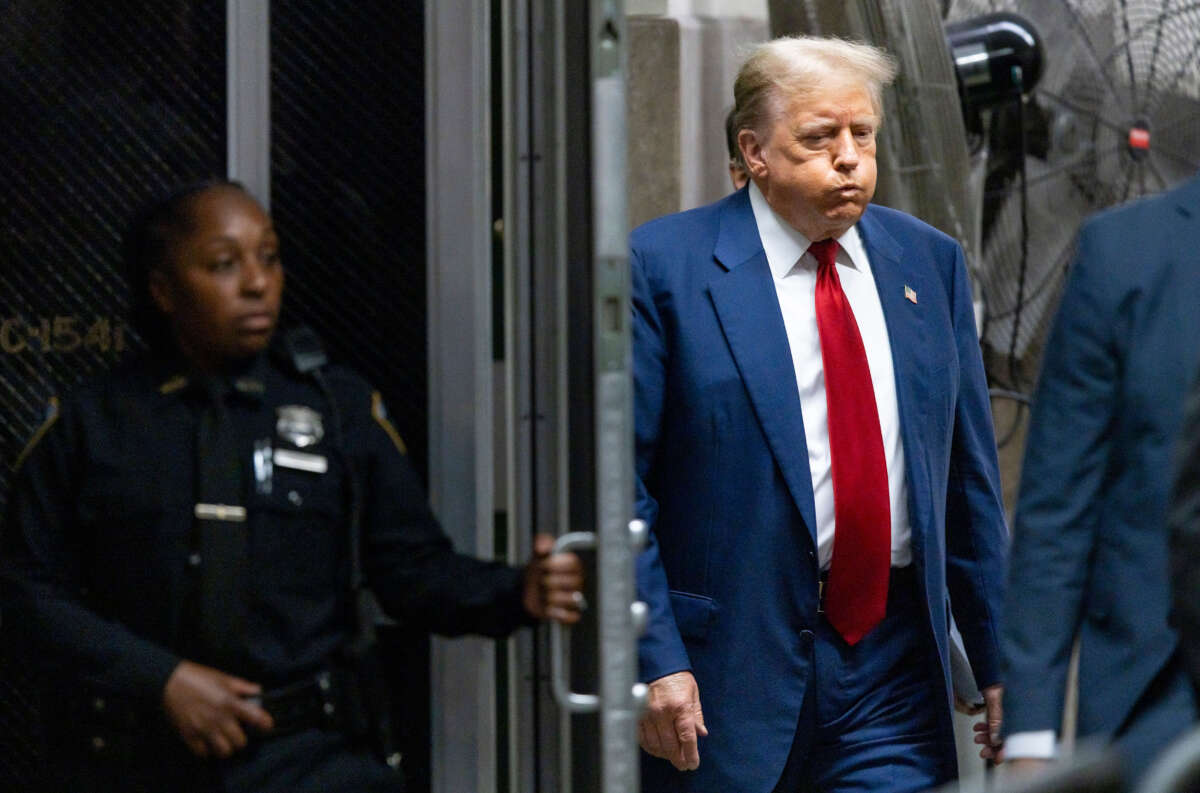Truthout is an indispensable resource for activists, movement leaders and workers everywhere. Please make this work possible with a quick donation.
New York Justice Juan Merchan, the judge overseeing the trial regarding former President Donald Trump allegedly concealing “hush money” payments in an illegal manner, has ruled that Trump violated terms of his gag order and fined him thousands of dollars for doing so.
Within his order, Merchan ruled that Trump was in contempt of court for issuing nine statements, on his social media site Truth Social and his campaign website, that targeted individuals he was expressly forbidden from commenting on. Merchan fined Trump $1,000 for each instance, for a total punishment of $9,000.
In a hearing regarding the contempt charges last week, Trump’s defense lawyers had tried to claim that some of the violations were improper due to him “reposting” the content from other users. Merchan flatly rejected that notion, writing that “a repost, whether with or without commentary by the Defendant, is in fact a statement of the Defendant.”
Merchan also noted that $1,000 fines for each offense might not be enough to curtail Trump from making these kinds of statements in the future. He suggested that Trump could face steeper fines going forward— or even potential jail time — if he violated the gag order again.
“Defendant is hereby warned that the Court will not tolerate continued willful violations of its lawful orders and that if necessary and appropriate under the circumstances, it will impose an incarceratory punishment,” Merchan wrote.
Trump has until May 3 to pay the $9,000 in fines. He also has until the end of the day Tuesday to remove the online content in question.
Trump has framed the gag order as an unconstitutional violation of his speech rights, but such orders are not uncommon in criminal courts where a person’s public statements could influence the outcome of a trial. Trump’s vehement criticisms online against potential witnesses, and the possibility that he would issue such statements against jurors, prompted prosecutors from the Manhattan District Attorney’s office to request the order, which Merchan initially imposed in March.
The original order forbade Trump from making disparaging comments against witnesses (confirmed or potential), jurors, court staff, and members of the prosecution team. The order was later amended to include family members of court staff, following Trump’s aggressive comments regarding Merchan’s daughter. Under the order, Trump is still allowed to discuss the case itself, to maintain his claims of innocence in public, and to criticize Merchan, as well as Manhattan DA Alvin Bragg.
The trial centers around allegations from the DA’s office that Trump falsified business records in order to conceal hush money payments to women he had extramarital affairs with, as such revelations could have harmed his chances to win the presidency in the runup to the 2016 election. In New York, it is a crime to falsify records in this manner, and it becomes a felony level crime if it is done to conceal another potential crime — in this case, to hide payments that should have been disclosed to federal elections officials.
A terrifying moment. We appeal for your support.
In the last weeks, we have witnessed an authoritarian assault on communities in Minnesota and across the nation.
The need for truthful, grassroots reporting is urgent at this cataclysmic historical moment. Yet, Trump-aligned billionaires and other allies have taken over many legacy media outlets — the culmination of a decades-long campaign to place control of the narrative into the hands of the political right.
We refuse to let Trump’s blatant propaganda machine go unchecked. Untethered to corporate ownership or advertisers, Truthout remains fearless in our reporting and our determination to use journalism as a tool for justice.
But we need your help just to fund our basic expenses. Over 80 percent of Truthout’s funding comes from small individual donations from our community of readers, and over a third of our total budget is supported by recurring monthly donors.
Truthout’s fundraiser ended last night, and we fell just short of our goal. But your support still matters immensely. Whether you can make a small monthly donation or a larger one-time gift, Truthout only works with your help.
